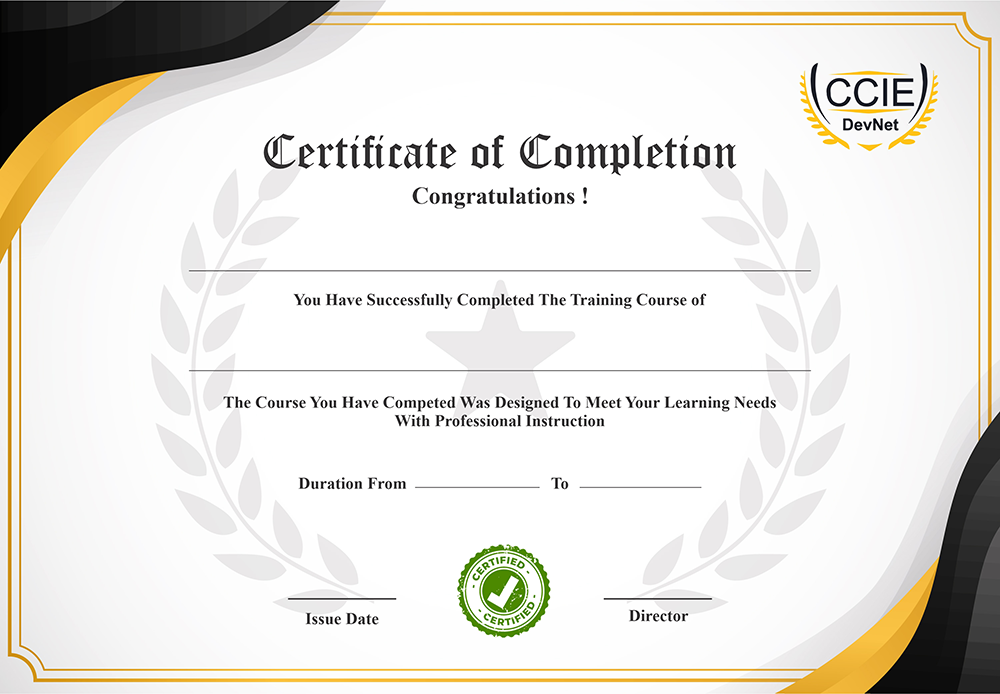CCNA DevNet Training for Network Engineers
Batch Timing
Regular: 2 Batches
Weekends: 2 Batches
Price: $150
Request Call Back Class Room & Online Training Quotation
CCNA DevNet Training for Network Engineers
The Cisco DevNet Associate certification is intended for individuals who perform a developer role and have one or more years of hands-on experience developing and maintaining applications that are built on top of Cisco platforms. The CCNA DevNet Training Program is the beginning of a great successive career.
Syllabus for CCNA DevNet Training
- 1.1 Compare data formats (XML, JSON, and YAML)
- 1.2 Describe parsing of common data format (XML, JSON, and YAML) to Python data structures
- 1.3 Describe the concepts of test-driven development
- 1.4 Compare software development methods (agile, lean, and waterfall)
- 1.5 Explain the benefits of organizing code into methods / functions, classes, and modules
- 1.6 Identify the advantages of common design patterns (MVC and Observer)
- 1.7 Explain the advantages of version control
- 1.8 Utilize common version control operations with Git
- 1.8.a Clone
- 1.8.b Add/remove
- 1.8.c Commit
- 1.8.d Push / pull
- 1.8.e Branch
- 1.8.f Merge and handling conflicts
- 1.8.g Diff
- 2.1 Construct a REST API request to accomplish a task given API documentation
- 2.2 Describe common usage patterns related to webhooks
- 2.3 Identify the constraints when consuming APIs
- 2.4 Explain common HTTP response codes associated with REST APIs
- 2.5 Troubleshoot a problem given the HTTP response code, request and API documentation
- 2.6 Identify the parts of an HTTP response (response code, headers, body)
- 2.7 Utilize common API authentication mechanisms: basic, custom token, and API keys
- 2.8 Compare common API styles (REST, RPC, synchronous, and asynchronous)
- 2.9 Construct a Python script that calls a REST API using the requests library
- 3.1 Construct a Python script that uses a Cisco SDK given SDK documentation
- 3.2 Describe the capabilities of Cisco network management platforms and APIs (Meraki, Cisco DNA Center, ACI, Cisco SD-WAN, and NSO)
- 3.3 Describe the capabilities of Cisco compute management platforms and APIs (UCS Manager, UCS Director, and Intersight)
- 3.4 Describe the capabilities of Cisco collaboration platforms and APIs (Webex Teams, Webex devices, Cisco Unified Communication Manager including AXL and UDS interfaces, and Finesse)
- 3.5 Describe the capabilities of Cisco security platforms and APIs (Firepower, Umbrella, AMP, ISE, and ThreatGrid)
- 3.6 Describe the device level APIs and dynamic interfaces for IOS XE and NX-OS
- 3.7 Identify the appropriate DevNet resource for a given scenario (Sandbox, Code Exchange, support, forums, Learning Labs, and API documentation)
- 3.8 Apply concepts of model driven programmability (YANG, RESTCONF, and NETCONF) in a Cisco environment
- 3.9 Construct code to perform a specific operation based on a set of requirements and given API reference documentation such as these:
- 3.9.a Obtain a list of network devices by using Meraki, Cisco DNA Center, ACI, Cisco SD-WAN, or NSO
- 3.9.b Manage spaces, participants, and messages in Webex Teams
- 3.9.c Obtain a list of clients / hosts seen on a network using Meraki or Cisco DNA Center
- 4.1 Describe benefits of edge computing
- 4.2 Identify attributes of different application deployment models (private cloud, public cloud, hybrid cloud, and edge)
- 4.3 Identify the attributes of these application deployment types
- 4.3.a Virtual machines
- 4.3.b Bare metal
- 4.3.c Containers
- 4.4 Describe components for a CI/CD pipeline in application deployments
- 4.5 Construct a Python unit test
- 4.6 Interpret contents of a Dockerfile
- 4.7 Utilize Docker images in local developer environment
- 4.8 Identify application security issues related to secret protection, encryption (storage and transport), and data handling
- 4.9 Explain how firewall, DNS, load balancers, and reverse proxy in application deployment
- 4.10 Describe top OWASP threats (such as XSS, SQL injections, and CSRF)
- 4.11 Utilize Bash commands (file management, directory navigation, and environmental variables)
- 4.12 Identify the principles of DevOps practices
- 5.1 Describe the value of model driven programmability for infrastructure automation
- 5.2 Compare controller-level to device-level management
- 5.3 Describe the use and roles of network simulation and test tools (such as VIRL and pyATS)
- 5.4 Describe the components and benefits of CI/CD pipeline in infrastructure automation
- 5.5 Describe principles of infrastructure as code
- 5.6 Describe the capabilities of automation tools such as Ansible, Puppet, Chef, and Cisco NSO
- 5.7 Identify the workflow being automated by a Python script that uses Cisco APIs including ACI, Meraki, Cisco DNA Center, or RESTCONF
- 5.8 Identify the workflow being automated by an Ansible playbook (management packages, user management related to services, basic service configuration, and start/stop)
- 5.9 Identify the workflow being automated by a bash script (such as file management, app install, user management, directory navigation)
- 5.10 Interpret the results of a RESTCONF or NETCONF query
- 5.11 Interpret basic YANG models
- 5.12 Interpret a unified diff
- 5.13 Describe the principles and benefits of a code review process
- 5.14 Interpret sequence diagram that includes API calls
- 6.1 Describe the purpose and usage of MAC addresses and VLANs
- 6.2 Describe the purpose and usage of IP addresses, routes, subnet mask / prefix, and gateways
- 6.3 Describe the function of common networking components (such as switches, routers, firewalls, and load balancers)
- 6.4 Interpret a basic network topology diagram with elements such as switches, routers, firewalls, load balancers, and port values
- 6.5 Describe the function of management, data, and control planes in a network device
- 6.6 Describe the functionality of these IP Services: DHCP, DNS, NAT, SNMP, NTP
- 6.7 Recognize common protocol port values (such as, SSH, Telnet, HTTP, HTTPS, and NETCONF)
- 6.8 Identify cause of application connectivity issues (NAT problem, Transport Port blocked, proxy, and VPN)
- 6.9 Explain the impacts of network constraints on applications
Download CCNA DevNet Demo
CCNA DevNet Training & Certification
Learn the most in-demand CCNA DevNet Training & Certification course that will help you gain skills in writing CCNA DevNet and working with packages, such as SciPy, Matplotlib, Pandas, Scikit-Learn, NumPy, web scraping libraries, and the Lambda function. In this online CCNA DevNet training you will learn how to write CCNA DevNet code for Big Data systems like Hadoop and Spark. Get CCNA DevNet certification and gain hands-on experience by working on real-world projects.

Key Features
Skill Level
Beginner, Intermediate, Advance
We are providing Training to the needs from Beginners level to Experts level.
Course Duration
90 Hours
Course will be 90 hrs to 110 hrs duration with real-time projects and covers both teaching and practical sessions.
Total Learners
2000+ Learners
We have already finished 100+ Batches with 100% course completion record.
Assignments Duration
50 Hours
Trainers will provide you the assignments according to your skill sets and needs. Assignment duration will be 50 hrs to 60 hrs.
Support
24 / 7 Support
We are having 24/7 Support team to clear students’ needs and doubts. And special doubt clearing sessions every week.
Frequently Asked Questions
CCNA DevNet exam validates candidate’s knowledge and skills in software development and design including basic understanding of using APIs, Cisco platforms and development, and infrastructure and automation. In this exam, the candidates will learn about:
- Implementing basic network applications using Cisco platforms as a base
- Applying automation workflows across network, security, collaboration, and computing infrastructure
- CCNA DevNet exam is for those who can perform a developer role. Candidates with one or more years of hands-on experience in developing and maintaining applications.
- Candidates before taking the exam should develop a basic understanding of computer literacy and good skills in PC operating system navigation.
- Also, they must have basic Internet usage skills and hands-on experience with a programming language (specifically Python).
For this, candidates will get 120 minutes to complete the exam.
The exam can contain various questions types that can be Multiple-Choice Single Answer, Multiple-Choice Multiple Answer & Drag and Drop Fill-in-the-Blank & Testlet.
This exam is available in English and Japanese language.
The cost of the exam is $150 USD.
Batch Schedule
| Date | Course | Training Type | BATCH | REGISTER |
|---|---|---|---|---|
| 02 January 2022 | CCNA DevNet | Classroom / Online | Weekdays (Mon-Fri) | Book Now |
| 08 January 2022 | CCNA DevNet | Classroom / Online | Weekend (Sat-Sun) | Book Now |
| 16 January 2022 | CCNA DevNet | Classroom / Online | Weekdays (Mon-Fri) | Book Now |
| 21 January 2022 | CCNA DevNet | Classroom / Online | Weekend (Sat-Sun) | Book Now |
Students Reviews





